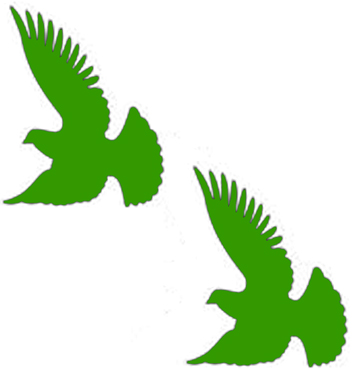
May 15th, 1998
Nine Champions Create A Champion
Part 5 of 5
by Bob Kinney
Silverado
What follows is the greatest undertaking I have ever tackled at one time. I interviewed William Geerts, Belgium; Tony Melucci, Rhode Island, U.S.A.; August Daelemans, Belgium; Horst Hackemer, Wisconsin, U.S.A.; Hans Eijerkamp, Holland; Gary Squibb, England; Campbell Strange, Texas, U.S.A.; and Piet Manders, Holland.
Each a Champion competitor in his area and each a contributor to the excellence of the sport. The assignment was to take a four week old baby (approximately weaning age) and cover every aspect of its handling, training, and education through YB year, Yearling year, and Two Year Old year. In some cases, we deviated from one bird to the entire round in that age group out of necessity, but I am sure what follows will be first of great interest and secondly of educational value. I was surprised at the similarities, and at the differences. One of the great values of this piece of work is the availability of side by side comparison. I do not believe any of these gentlemen would tell you that their system is the only road to success. I do believe they would tell you that having a system and sticking to it is essential.
Q. Now your YB, 5 hours ago, has completed his yearling season and established himself as nearly Champion status. He is going to be a two year old widower this year, what will you do differently with him?
August Daelemans: He will go through the same procedures as last year, but he will go to 13 races this year and will be stopped August 1st to breed two YBs.
Horst Hackemer: He gets a hen he likes. He will not raise YBs but will go on the system with dry widowhood. He will go to a 500 mile race this year.
Tony Melucci: He will be treated the same, but at the end of the season he will be paired to the best breeding hen available and allowed to raise a YB.
Campbell Strange: He won't see his hen as much this year. He will fly longer races and will be allowed to raise a baby at the end of the season.
Gary Squibb: He will go to 400 as a two year old. Rubbish goes to 500. Since he is a Champion, at the end of the season he will raise two YBs and a second set will be switched.
Tom Fahmie: I lost mine.
Hans Eijerkamp: He will have some extra motivation. I will ignore him for 14 days, then when I go in he will be glad to see me. He will get extra attention from me, a little extra to eat, allowed to feel like a Champion. He will sit on my knee or shoulder and get some treats. We will let him raise two YBs and switch a set of eggs.
William Geerts: Same system as yearlings, except they will go to all 13 races. When done, he will raise two YBs and be separated.
Piet Manders: He will go to 12 races, raise two YBs and be separated.
Q. What advice would you offer to those fanciers looking to improve?
August Daelemans: Compete against the very best, select the birds that win in that competition and kill the rest. Take care of your best breeders and be real fanciers; in other words, develop a relationship with your birds.
Horst Hackemer: First, upgrade your pigeons and maintain absolute health!
Tony Melucci: Cull severely, keeping only the best, add something of quality to your loft to try.
Campbell Strange: The loft is the bird's home, make it happy and keep it healthful. Obtain the best birds you can from fanciers winning in your same type of environment.
Gary Squibb: Hard work, establish a routine and observation.
Tom Fahmie: Observation, not just birds, but people, perseverance and patience.
Hans Eijerkamp: Work hard, 365 days a year. Be patient, get good birds as the quality comes back. If you can't afford the best birds, buy the eggs.
William Geerts: Follow your own way, try to build on your own experience and don't listen to anyone else. As little as possible let strangers near your loft. It's your bird's home.
Piet Manders: Observation, the best pigeons and take good care of the birds, ESPECIALLY in the winter months!!
Conclusion: My thanks and admiration, gentlemen! It was a lot of work, but you made the interview pleasant with your good nature and courtesy.
For the readers - I've done many interviews over the years and the simpler the methods the better the flyer. Common threads are a realization it takes superior birds and there aren't many. It takes a system, most any system and the discipline to stick to it all year and probably what can best be described as a heart felt respect for our racers.
